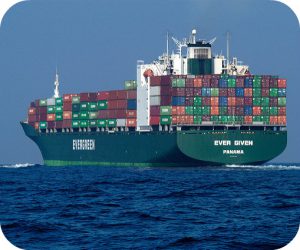 Every day, thousands of huge cargo ships criss-cross oceans delivering products to markets all over the globe. But that’s not the only thing these vessels bring to port: they also emit sulfuric gases and fine particles that settle over cities as smog. In order to combat all this toxicity, a couple of years ago the United Nations passed a resolution to reduce the amount of sulfur content in maritime fuels. According to the guidelines, by 2020 shippers must switch to fuels that contain less than 0.5 percent of sulfur, as opposed to the current standards which allow for sulfur content of 3.5 percent.
Every day, thousands of huge cargo ships criss-cross oceans delivering products to markets all over the globe. But that’s not the only thing these vessels bring to port: they also emit sulfuric gases and fine particles that settle over cities as smog. In order to combat all this toxicity, a couple of years ago the United Nations passed a resolution to reduce the amount of sulfur content in maritime fuels. According to the guidelines, by 2020 shippers must switch to fuels that contain less than 0.5 percent of sulfur, as opposed to the current standards which allow for sulfur content of 3.5 percent.
Although the world’s largest ports and shipping terminals have agreed to these terms, the transport companies who own the ships have been slow to make changes. In fact, shippers have been so reluctant to switch to low-sulfur fuels that experts expect few of these firms will be in line with the new rules by the start of 2020. Along with the high costs associated with making the change, industry insiders say that transport companies are questioning how the UN will be able to enforce these rules. As a result, many shipping firms are waiting until the last minute to find out if the guidelines have any meaning. “It comes down to who is going to blink first,” said oil analyst Neil Beveridge. “So far, the shipping industry looks like it is sleepwalking into a disaster. Everyone is waiting for everyone else to make the first move.”
Shipping companies currently have three costly options available to them if they want to get in line with the UN’s rules. The first one is to switch to low-sulfur fuel, which can cost $250 per ton more than fuel with high sulfur content. This can lead to increased costs as high as $3 million per vessel. The second option is to install similarly expensive “scrubbers” into fuel tanks that remove exhaust and other pollutants. Finally, maritime transport firms could also move away from petroleum entirely and convert their vessels to run on cleaner liquified natural gas. That’s what many cruise ships have opted for, although they represent just a fraction of the global shipping industry. Not only are most shippers wary of the added costs, but they’re also afraid that emissions regulations will change again in the future. In that case, it’s possible that the expensive measures they take now will be obsolete according to the potentially revised rules.
Questions:
- Why are many shipping companies reluctant to adapt to the United Nations’ new fuel restrictions?
- Do you think shipping companies should start getting in line with the UN’s rules or should they continue to wait and see what happens across the industry?
Source: Clifford Krauss, “Shipping Industry Stares Down New Fuel Restrictions,” The New York Times, October 9, 2018. Photo by NOAA’s National Ocean Service.
